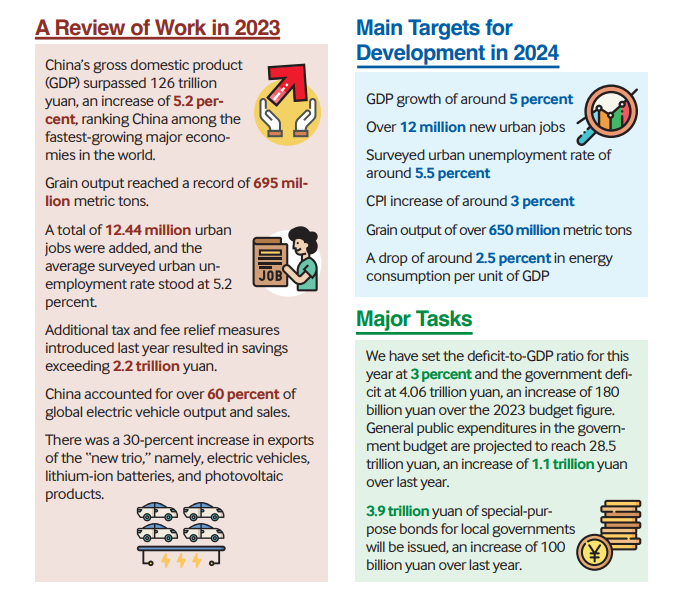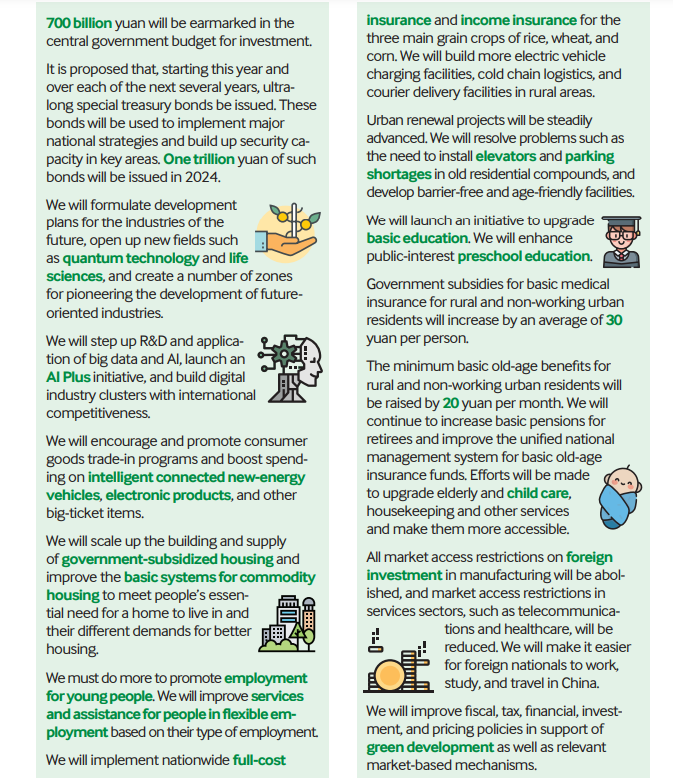The annual meetings of China’s top legislative body, the National People’s Congress (NPC), and its political advisory body, the Chinese People’s Political Consultative Conference (CPPCC), were held in Beijing from March 4-March 11, 2024. Referred to as the “Two Sessions” these gatherings convene thousands of delegates to ratify laws, review work reports, and allocate budgets, as well as press conferences for senior leaders to address the public on all the matters.
Below are the key takeaway points from the session:
New Quality Productive Forces:
During the second session of the 14th National People’s Congress (NPC), President Xi Jinping emphasized the importance of developing new high-quality productive forces tailored to local conditions.
Premier Li also called for boosting “self-reliance and strength in science and technology,” spelling out a push to upgrade industrial supply chains and enhance China’s position as a high-tech innovator. That included a boost to China’s annual budget for science and technology by 10% to an unprecedented 370.8 billion yuan ($51.6 billion).
Currently, Beijing is also actively building an international science and technology innovation center. The Anhui province is accelerating the development of three major science and technology innovation hubs in quantum information, fusion energy, and deep space exploration. Moreover, Heilongjiang province is implementing digital transformation in manufacturing, empowering small and medium-sized enterprises with digital capabilities, and promoting pilot demonstration projects in intelligent manufacturing.
China will also enhance its leading position in industries such as new energy vehicles, the development of hydrogen power, new materials, innovative drugs, and other cutting-edge sectors, according to the government work report.
Build Consensus for Chinese Modernization:
President Xi Jinping emphasized the importance of Chinese political advisors building a broad consensus to contribute to Chinese modernization during the second session of the CPPCC. Xi urged political advisors from various backgrounds to conduct in-depth research and provide suggestions aligned with the strategic goals outlined by the CPC National Congress and the Central Economic Work Conference.
Regarding Taiwan-related work, Xi called for unity against “Taiwan independence” and emphasized the promotion of national reunification through peaceful means.
Fu Zhigan, the vice chairman of the Central Committee of the Taiwan Democratic Self-Government League and a national political advisor, suggested promoting economic and trade cooperation between the island of Taiwan and the Chinese mainland by better connecting the island’s land, sea, and air transportation infrastructure.
Moreover, Wang Huning, chairman of the CPPCC National Committee, stated how China should improve its political stance to have a better understanding of Chinese modernization under the leadership of the CPC, by making “high-quality suggestions” to improve the body’s capability of discussing state affairs.
Political advisors Xia Xianpeng, Tian Hongqi, Wu Jianping, Zhao Yuliang, Huang Miansong, and Hu Songqin also talked about how to boost cross-Strait cooperation on industrial and supply chains, how to leverage core internet technologies to bolster the country’s strength in cyberspace, contribute to ecological protection and promote green and low-carbon economic development.
Deepening Reform to Comprehensively Enhance Strategic Capabilities in Emerging Areas
The meeting also highlighted the need for the armed forces to strengthen their sense of mission, and promote innovation.
The Chinese military has vowed to implement to enhance strategic capabilities in emerging areas, with military lawmakers and experts stressing the importance of new quality productive forces including artificial intelligence (AI), unmanned technologies, aerospace, and cyberspace in modern warfare, crucial for national strategies and Chinese modernization efforts.
After the meeting, lawmakers and political advisors from the People’s Liberation Army (PLA) and the People’s Armed Police Force (PAP) said that technology must be firmly endorsed and the Chinese military should push forward technology innovations including Artificial Intelligence (AI), to be able to win future warfare.
China remains dedicated to enhancing national security through prioritizing coordination among maritime military preparedness, safeguarding maritime rights, and the development of the marine economy. Additionally, it will also optimize aerospace infrastructure and establish a robust cyberspace defense system.
Way Forward
Led by Chairman Zhao Leji, the National People’s Congress (NPC) Standing Committee reiterated its commitment to improving the legislative structure to support China’s rejuvenation efforts. The Committee outlined plans to strengthen the implementation of the Constitution, improve oversight of compliance, and enact laws covering areas like environmental protection, financial stability, private sector promotion, civil enforcement, and social assistance.
The discussions and actions announced during the Two Sessions highlight China’s active efforts to push forward reforms, foster innovation, and promote cooperation, both domestically and internationally.


Zehra Zaidi is a Research Fellow & Program Coordinator at CRSS. She holds an M.Phil. in International Development and is passionate about highlighting issues of marginalised communities. She is also leading the Asia Watch section at CRSS.

